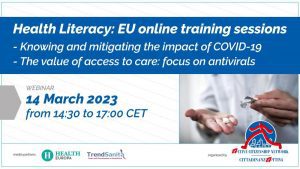
Mariano Votta, responsible for EU Affairs at Cittadinanzattiva & Director at Active Citizenship Network discusses the important role of health literacy during COVID-19.
Evidence collected during the COVID-19 crisis shows that the pandemic has had a significant impact on health services, clinicians, and patients. For instance, oncological and chronic patients struggled to access vital care, especially during the first wave of the pandemic.
Exactly three years after the widespread lockdowns, the situation has thankfully changed for the better. In that time, we have seen huge investments in medical research leading to the discovery and large-scale use of COVID-19 vaccines as well as enormous effort and dedication from all those working across healthcare and to whom we are eternally grateful. The vast majority of citizens too played their part in adhering to local measures to mitigate the threat of the virus. All these factors have led to a significant reduction in the number of infections and incidence of COVID-19 and its variants.
However, despite the enormous progress, we are not free from COVID-19. It is therefore important, as we return to some semblance of normality, that messaging about the virus is clear. The COVID-19 pandemic has posed significant challenges to patient communities, and Active Citizenship Network, in continuity with its commitment to fighting COVID-19, is committed to helping find solutions to these challenges. In particular, continuing to bring attention to the issue and ensure COVID patients do not continue to experience the neglect and abandonment that non-COVID patients experienced during the pandemic, Active Citizenship Network has decided – through two different EU projects – to invest in health literacy to better help mitigate the effects of COVID.
The COVID-19 pandemic has taught us how much damage an uninformed citizen and patient – who perpetrates unhealthy health-related behaviour – can cause and how much, on the other hand, an informed and educated citizen and patient can make a difference not only to his or her health but to public health in general.
Understanding what the risks for some patients with comorbidities are and what, on the other hand, the benefits brought by COVID-19 vaccination, represent two elements that can mitigate the COVID-19 pandemic and other similar events. We cannot rule out the possibility of future pandemics so we must invest in preparedness efforts now.
Fostering opportunities for discussion allows leaders of civic organisations and Patient Advocacy Groups (PAGs) to better share their needs, concerns, and best practices in the prevention, management, treatment, and follow-up of COVID-19. This will enable us to improve the current situation of care for patients with this disease. Health literacy thus becomes a very powerful tool for individual and public health assurance that allows us to understand that health is a public good to be preserved through individual preventive actions that become even more effective the more we follow them.
As declared by experts, the COVID-19 infodemic (an excessive amount of information about a problem that is typically unreliable, spreads rapidly, and makes a solution more difficult to achieve) showed that low health literacy of a population is a globally underestimated public health problem. For example, in Europe, nearly half of the adults reported having problems with health literacy and lacked relevant skills to take care of their health and the health of others.
Both supported by an unrestricted grant from Pfizer, the EU Project ‘Protecting the value of access to care during – and after – the COVID-19 pandemic across Europe: focus on antivirals’ is led by Active Citizenship Network, while ‘Improving health literacy for better public and patient involvement in COVID-19 pandemic mitigation’ is led by IAPO P4PS Observatory with the involvement of IAPO (International Alliance of Patient Organizations), the Italian NGO Cittadinanzattiva through its European branch Active Citizenship Network, ALCER (Spanish federation of associations fighting kidney disease), and Studiorum (Macedonian center for regional policy research and cooperation).
The training session planned on 14 March 2023 is the first activity realised in the framework of the two mentioned projects, and it will allow us to provide a common set of updated data, share information, and identify the lessons learned, but also to obtain feedback from PAGs. As usual, the initiative is mainly tailored to the leaders of Patients Advocacy Groups (PAGs) and civic associations coming from the EU Member States (registration is free but mandatory, register here.)
Mariano Votta
Responsible for EU Affairs at Cittadinanzattiva & Director at Active Citizenship Network










